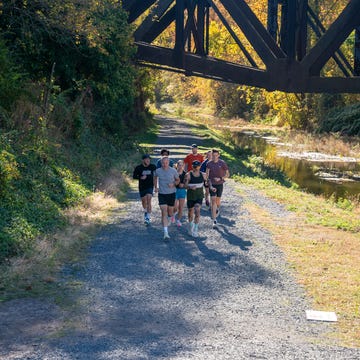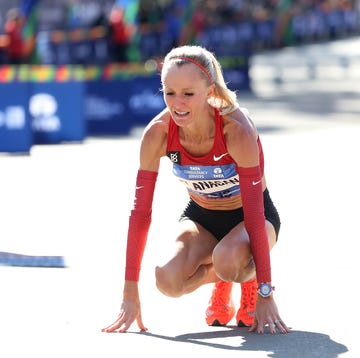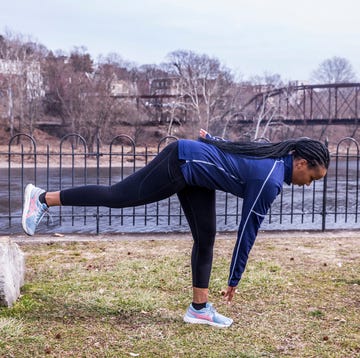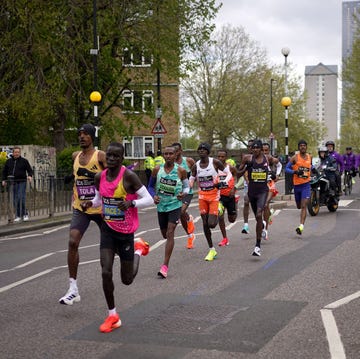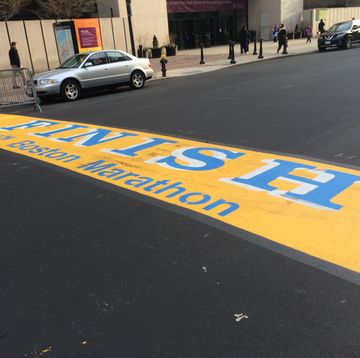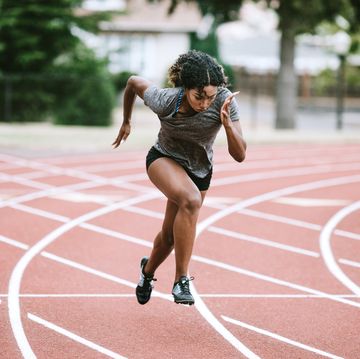Three and a half minutes is not a long time to realize one's dream. So much has to go right, and so much more can go wrong. Yet when the gun fired for the 1500m final in Beijing last summer, Nick Willis calmly and confidently settled in along the rail. There were no signs of panic even as he was slowly squeezed toward the back of the field.
With 400 meters to go, in the biggest race of his life, Willis was in 11th place. Still hugging the rail, he charged into the turn. Tenth place. Ninth. Eighth. In sixth place coming out of the final turn, Willis swung out to lane three and surged into third. With 20 meters to go he thought he had bronze. A lean at the line was followed by an agonizing wait for confirmation: third place in 3:34.16.
Willis was a mere 0.05 ahead of the fourth-place finish, which he had once said "wouldn't be any more rewarding than tenth." But he wasn't fourth, he was third. And those fractions of a second were no happy accident. Willis had planned for them. Built his life around them. Expected them.
"If you can have the best run of your life on the day that it matters the most, then you'll get a medal. And I truly believe that was the best race of my life, on that day. Fortunately for me, my training, my mental and physical preparation all lined up."
A 4:01 miler as a teenager in New Zealand and an NCAA champion at the University of Michigan, Nick Willis has always been capable of great things. Yet he has never been one to simply rely on his natural gifts. A close look at Willis' life shows a young man with an uncommon focus, an ability to control every aspect of his life, and the faith to believe in that process.
As a kid running 20-30 miles per week, Willis learned to love the sport from his first coach, Don Dalgliesh. "He took the safe and calculated approach with me, and he never let me do more than I should have," Willis recalls. Just as he developed physically, Willis was also becoming a devoted student of the sport. "I'd buy John Walker's books, Peter Snell's books," he says. "Anything I would find, I would like to experiment with it. So I guess I got a bit addicted when I was 17 years old."
Drawn to Michigan by coach Ron Warhurst's success with miler Kevin Sullivan, Willis headed to Ann Arbor in 2002. Yet despite a stellar season, he returned home after his freshman year feeling lost and lonely. He was still coping with unresolved emotions stemming from the death of his mother 16 years earlier, and felt that he'd also alienated himself from his new teammates. "That was a big time of contemplating things beyond the tiny bubble I'd put myself in," he says.
He emerged from that period with a strong sense of faith. Religion provided a welcome balance to his life, and Willis returned to Michigan rejuvenated for his sophomore year.
"Ultimately we always had that one day, August 19, planned. We expected to be in that final, to focus for that day, and both mentally and psychologically I was ready."
| Ask the Coaches: Foamy Sweat. |
Living a dual life as a collegian and a budding international star, Willis redshirted in 2004 to prepare for the Olympics, where he advanced to the semifinals. After setting a Michigan record at 5,000m in 2005, he gave up his remaining NCAA eligibility to turn pro, and that summer placed sixth at the world championships. With his focus already on Beijing, he gave up the longer distances and began to focus exclusively on the 1500m.
Throughout, Willis was tinkering with his training, searching for the ideal mix for his body. Following the 2004 Olympics, where he missed the final by a fraction of a second, he had quickly built up to 100 miles per week for the first time. His body just as quickly responded with feedback in the form of a stress fracture in his femur. As a result he now builds his mileage only very slowly -- starting with 10 miles in his first week following a break, and increasing by just one mile per day each week until he reaches his normal 70-80 miles.
In addition to carefully managing his mileage, Willis decided to get serious about the extra things that would allow him to maximize his training. In 2007 he called his former roommate Gabe Sanders, by then a jumps coach at Williams College, to ask for help. "He told me that he knew [that] aerobic strength and conditioning alone would not get him to where he wanted to be," Sanders recalls. Willis told his friend, "I want to have the ability to go 60-60-60-50 because I know that's how it goes nine times out of 10 in championship races." The two men spent the summer developing a routine of dynamic stretches, mobility drills, and strength training. That work has evolved into the core of what Willis now terms his "5 percenters" (see sidebar) -- the extras, beyond his mileage and speed work, that Willis hopes will earn him an advantage. "I think it's what separates the great athletes from the medalists," Willis says, implying that being great isn't always enough.
Another ingredient in Willis' Olympic buildup was a day off every week. "Following God's advice to do six hard days of work and then taking a rest to recuperate and being spiritually refreshed, will help enable me to be excited for another eight to 10 years," he explains. "And it's really given me a new lease on life. On Mondays I'm excited to do that hard workout when a lot of my training partners have Mondayitis."
"There were lots of little waves going on: 'doubt-confidence-doubt-confidence,' but it wasn't extreme because I had the great support network, I had Sierra [Boucher, his wife] who was with me every day. I had my brother, Steve, there as a coach, I had Ron. All these people so truly believed -- more than I did, even, that it was going to happen."
Having found balance in his training and his faith, the puzzle was nearly complete. That final, and perhaps most critical, piece fell into place in the fall of 2006 when Willis met Sierra. She quickly filled a void in his life, particularly when double tibia stress fractures sidelined him that winter. The couple was engaged the following May and married in September.
Three months after the wedding, Steve Willis (a sub-4:00 miler himself) arrived in Ann Arbor, along with his family, to help coach his brother through the Olympics. "Team Willis" spent the next eight months living, traveling, praying, and training together, all sharing the same vision of success in Beijing.
In December 2007, with all of these pieces in place, Willis told Flotrack: "This year is the first time I've really, really believed that [a medal is] not just a hope and a holler and a dream, but it's something that I believe that I can [do]." After years laying the groundwork for this success with painstaking deliberation, he was finally prepared to embrace his destiny.
"I truly believe that God has had a plan for my life. Do I believe that God formulated it so that I would get third in the race? I don't have any answer to that, but I do believe that he knew I was capable."
An Olympic medal can collar its owner with the burden of high expectations, yet Willis appears to have gained strength from the experience. The smile tells that story.
It's February 2009, and Nick Willis is the last athlete to be introduced for the final event of the 2009 Reebok Boston Indoor Games. Pacing back and forth, jumping up and down, Willis is anxious to get going. Then the final 100 meters of the Olympic 1500m final flashes across the scoreboard, and a wide smile washes those nerves away. A 3:53.54 victory follows shortly thereafter, an early-season performance that is nothing less than dominating.
But what would it take for 2009 to be a success? "I would really have to win at least a silver medal at the world championships. That's all it would take," he says. With a smile.




